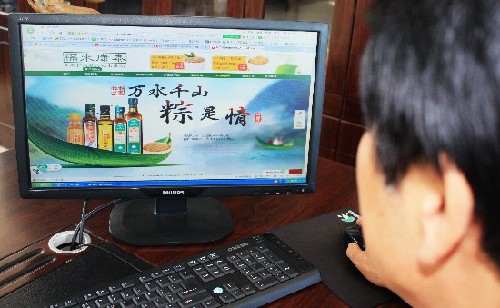E-commerce facilitates agricultural and animal products distribution
(chinadaily.com.cn) Updated: 2014-08-29 13:57The "8337" development strategy of Inner Mongolia autonomous region plans to develop the region into a production, processing and distribution base of green agricultural and animal products.
Therefore, the autonomous region should transform the development method of agriculture and animal husbandry under new circumstances, and improve the market competitiveness of agricultural and animal products to make achievements in building a distribution base.
According to Zhai Xiu, deputy director-general of the Agriculture and Animal Husbandry Bureau of Inner Mongolia, this requires strengthening support of e-commerce and other modern distribution methods and expanding distribution area in order to “purchase from and distribute to the whole country.” The autonomous region’s plan to purchase green agricultural and animal products throughout the county and distribute throughout the country has been gradually carried out.
Online marketing of specialty products
 |
|
Online marketing of specialty products.[Photo provided to chinadaily.com.cn] |
On May 28, Du Juan, who lives in Beijing, received flaxseed powder from Hohhot, North China’s Inner Mongolia autonomous region.
“It’s surprising to receive it so quick, because I just placed an order on Tmall.com (a business-to-customer platform for online retail introduced by Alibaba Group) on the afternoon of May 26. The powder is fresh, arriving only three days after its production date,” said Du.
The flaxseed powder’s producer, Inner Mongolia Yishanyuan Bio-Technology Co, is located in Ruyi Industrial Park in Hohhot. Although its online store has only been opened for a short time, the company has already made 1,090 deals for its flaxseed powder within a month, providing a new distribution channel for its products.
In 2005, Liu Hongju, now the general manager of Yishanyuan, was being laid off from an enterprise engaged in flaxseed oil extraction by high temperature processing. He then started to research the low temperature cold pressing process for flaxseed oil production at the age of 44 and built up his business from nothing.
“I think neither the European standard nor the American standard is the highest standard for food production. Natural products with well-preserved natural nutrients free from pollution produced by low temperature and physical methods throughout the whole production process are of the highest standard,” Liu said.
Through independent research, Liu Hongju took the lead in realizing low temperature cold pressing production of flaxseed oil in China. As to the comprehensive development of flaxseed, this technology can both preserve the various nutrients of flaxseed, and also increase the utilization rate of raw materials.
Yishanyuan achieved an annual flaxseed processing capacity of 3,000 tons in 2011, and the cold pressed flaxseed oil has been distributed across China. The company was challenged by imported flaxseed oil as it’s facing a bigger market.
Liu Hongju said that he has been thinking about “building Inner Mongolia into a production, processing and distribution base for green agricultural and animal products” in the development strategy of “8337,” while dealing with the production and distribution of his products.
He went on and explained that “we used to make efforts on production and processing, but with poor distribution conditions. However, we can’t afford to build national marketing channels and marketing teams now. So for enterprises like us, to distribute products directly from the place of origin through e-commerce has become an important solution for building our brand.” Currently, the flaxseed series products produced by Yishanyuan are selling in the national market online.
Online stores depend on agricultural and animal products
According to statistics from AliResearch, Inner Mongolia’s goods sold on Alibaba - the largest online business-to-business trading platform - totaled 1.8 billion yuan ($288.68 billion) in 2012, while agricultural products accounted for about 35 percent and were worth 630 million yuan. The proportion would be more if animal products were taken into consideration.
Ren Xuemei from Togtoh county of Hohhot opened her online store in 2006. Her “Comfy Crown” brand cashmere scarf has been one of the top three brands in sales volume in T-mall’s cashmere scarf category. She sold out over 3 million yuan in products during the November 11 shopping spree in 2013.
In her own way, she has distributed Inner Mongolia’s green agricultural and animal products to a larger market. Ren believes e-commerce is an important distribution channel for Inner Mongolia’s green agricultural and animal products, while Inner Mongolia’s online stores are heavily dependent on green agricultural and animal products.
On the other side, statistics also indicated that the e-commerce of Inner Mongolia was small both in total volume and scale. By the beginning of 2013, there were 32,830 sellers on Alibaba, and 84 percent of them had trade volume less than 1,000 yuan. In contrast, online sellers from Yiwu city in Zhejiang province total over 90,000.
For those with business insight, such an underdeveloped situation features unlimited potential and business opportunities. An increasing number of local businesses have been engaged in local e-commerce over the past years. At the Inner Mongolia Green Agricultural and Animal Product Exposition held in October 2013, Zhang Rui, an expert at AliResearch told the media that Inner Mongolia’s agricultural and animal products are of enormous potential in the field of e-commerce.
- Beijing-Tianjin-Hebei rolls out measures to tackle air pollution
- Prosecutors act to curb child abuse
- Shanghai mulls policies for more talent
- Construction on Nansha Islands 'befits China's intl obligations'
- Safety watchdog sends team to probe fatal fire in nursing home
- 175 grave robbers arrested in biggest-ever tomb raid
- China has no overseas military bases: Spokesperson
- Hero pilots died avoiding built-up area
- Canada to seize assets and extradite fugitives: Envoy
- At least 38 killed in nursing home fire in C China






